Split-based Institution DES First Producer of Paper Bags for Dog Waste in Croatia
ZAGREB, 26 Jan 2022 - A Split-based institution that employs persons with disabilities, DES, on Wednesday presented its new product, a paper bag with a cardboard pad for cleaning up dog waste, and DES is the first manufacturer of paper bags of that kind in Croatia.
Director Edita Maretić Dimlić said that they had opted for that product because they wanted to develop their own products and actively take part in raising awareness among citizens, especially dog owners, that dog waste should be cleaned up, and thus contribute to the image of a healthy and clean Split.
She noted that this was the first product they produced on their own and that had not been commissioned. There is an image of a dog on the paper bag, as well as writing, which says "Respect your city, be a conscientious citizen, and clean up instead of me, please".
The paper bag was designed by the institution's Mia Perčić, and DES director Maretić Dimlić said that it was made of recycled paper and that DES was the first producer of such a paper bag for cleaning up dog waste.
Prague has such paper bags, which, she said, they saw as a means of encouraging citizens to pick up dog waste.
The City of Split has ordered 26,667 paper bags from DES and so supported the institution's new product and its use. DES has donated 2,000 paper bags to city districts, local committees, the Sporting Dogs Club and the County Association of the Blind, said Maretić Dimlić.
She recalled that during the pandemic DES started producing cotton masks and announced they would soon start producing souvenirs.
For more, check out our dedicated lifestyle section.
ZSE Indices Increase
ZAGREB, 26 Jan 2022 - The main Zagreb Stock Exchange (ZSE) indices rose on Wednesday, the Crobex by 1.15% to 2,147.32 points and the Crobex10 by 1.01% to 1,306.91 points.
Regular turnover was HRK 7.4 million, or about HRK 2.8 million less than on Tuesday.
The highest turnover was generated by the Valamar Riviera stock, HRK 1.6 million. Its price went up by 2.99% to HRK 34.50 per share.
The stock of the HT telecommunications company turned over HRK 1.2 million, closing at HRK 184, up 0.27%.
The stock of the Atlantska Plovidba shipping company generated a turnover of HRK 1.19 million. Its price rose by 3.64% to HRK 370.
Forty-two stocks traded today, with 25 increasing in price and seven decreasing, while 10 were stable.
(€1 = HRK 7.525776)
For more, check out our business section.
Plenković: Croatia to Procure 89 Bradleys for US$ 145.3 Million
ZAGREB, 26 Jan 2022 - Croatia and the USA have agreed on the procurement of Bradley fighting vehicles, for which Croatia will pay US$ 145.3 million, Prime Minister Andrej Plenković said on Wednesday.
"Agreement has been reached with the US side regarding the army fighting vehicles that have been discussed over the past few years," Plenković said in a comment on the M2A2 ODS fighting vehicle.
The total value of the deal is $196.4 million, the US donation will amount to $51.1 million, which means that Croatia will pay $145.3 million.
Croatia will obtain 62 fighting vehicles, 22 vehicles for spare parts and five for training, and their upgrading will be performed at the Đuro Đaković company in Slavonski Brod.
The equipment includes a 25 mm automatic cannon, a 7.62 mm machine gun, and anti-tank missiles.
Plenković said that with the deal, which had been discussed since 2017, Croatia had achieved several strategic objectives - strengthening its alliance with the USA, lowering the price of the vehicles in relation to earlier talks, and securing a job for Đuro Đaković, which, he said, could become a "broader" service centre.
By joining NATO Croatia has assumed the obligation to form by 2026 a medium infantry brigade, which requires appropriate equipment for the army, the PM said.
For more, check out our dedicated politics section.
President, Association Discuss Problems in Post-Earthquake Reconstruction
ZAGREB, 26 Jan 2022 - President Zoran Milanović on Wednesday met with representatives of SOS Zagreb, an association of citizens founded a year ago with the aim of ensuring a faster and better reconstruction of properties in Zagreb damaged by the March 2020 earthquake.
Members of the association informed the president of the obstacles and problems encountered by citizens in efforts to have their properties reconstructed. They warned of the danger that time would run out to apply for funds under the EU Solidarity Fund to be used for post-earthquake reconstruction and that the cost of reconstruction of many Zagreb hospitals, schools and kindergartens would eventually have to be covered by taxpayers, the Office of the President said in a statement.
The meeting pointed to the lack of a central body in charge of post-earthquake reconstruction as the key reason why reconstruction was slow and ineffective.
This has resulted in only 75 properties in Zagreb undergoing reconstruction two years since the earthquake, the association's members said.
Private reconstruction is encouraged, however, numerous buildings are not creditworthy, which is a problem that requires the state's help in the form of faster compensation for private funds invested, while reconstruction should be compulsory, it was said at the meeting.
For more, check out our dedicated politics section.
Plenković: Three Segments to Mitigate Energy Price Hike
ZAGREB, 26 Jan 2022 - Prime Minister Andrej Plenković announced on Wednesday that the government would act in three segments in an effort to alleviate the energy price hike - social transfers, allowances for gas and electricity, and elements related to the taxation system, VAT.
"The government is carefully analysing trends in energy prices and the measures other European Union member states are taking. Currently, we are considering all the options that will protect the standard of citizens," Plenković said at a conference "Energy Security in an Era of Fast Decarbonisation," organised by the Jutranji List daily.
Recalling that last autumn, the government capped the price of oil products, when it was necessary, Plenković reiterated that the situation is being monitored with regard to the growing prices of electricity and gas.
He said that the government's activities would be conducted in three segments with the basic aim of relieving the impact on households and citizens.
The first segment is a measure of social transfers with the Prime Minister announcing increased allowances for socially vulnerable citizens. Today that is a maximum allowance of HRK 200 and 64,000 socially vulnerable households will receive vouchers.
"Our plan is to adopt a new regulatory framework to increase the scope of those allowances and expand their implementation to gas besides electricity. We will expand the circle of beneficiaries entitled to those allowances. We will act through all three elements to protect the most vulnerable in society," said Plenković.
The second part of the package refers to reviewing all elements in the final calculation of the price of gas and electricity. Here we will lean on the important role HEP has as the national energy company which in these circumstances, has the strength to take on some of the burdens, he underscored.
The third element is to review all the elements we have through the taxation system and VAT with the Prime Minister recalled that currently, VAT on electricity is 13% and 25% for gas. "We are preparing a substantial fiscal analysis of impact, we are considering a reduction to buffer the impact on citizens and the economy," said Plenković.
In his address, he recalled the reasons for the significant energy price hike adding that Croatian citizens did not experience any significant growth in the past period. In the EU the price of energy increased by an average of 30%.
In the context of the global energy crisis, speculation is increasing about the problem of energy supplies while Plenković said that Croatia still has significant domestic production of hydrocarbons and satisfies 20% of its consumption whereas with gas it satisfied 30% of domestic consumption last year.
He underscored the LNG Terminal on Krk island saying that Croatia has secured gas supplies from all parts of the world.
"We recognised the strategic significance of this project for Croatia's energy independence and to diversify supplies," he said, adding that the terminal gives Croatia a different dimension on Europe's energy map.
Last year 21 ships with LNG arrived at the terminal and unloaded about 3 million cubic metres which provided 1.7 billion cubic metres of gas that was handed over to Croatia's transport system. This year 24 ships are planned.
Croatia has to be ambitious in energy transition
Plenković believes that Croatia has to be ambitious with regard to energy transition and he announced public consultation regarding Croatia's hydrogen strategy to 2050. He recalled planned investments in solar power plants, new technology, geothermal water, nuclear energy and the Krško nuclear power plant.
He recalled that 37% of the funds from the Recovery and Resilience mechanism is earmarked for green transition and funds will be available from other sources too.
He added that a new EU legislative package foresees the establishment of a social fund for climate policies that would ensure additional funds to relieve the impact of reducing greenhouse emissions. Croatia would have €1.4 billion available which will help citizens finance investments in energy efficiency, new heating and cooling systems and cleaner mobility.
For more, check out our dedicated politics section.
Croatia Ends EHF Euro 2022 with a Draw against the Netherlands - 28:28
January 26, 2022 - Croatia ended their EHF Euro 2022 campaign with a draw against the Netherlands on Wednesday night.
The last European Championship match for Croatia was against the Netherlands in the last round of Group I on Wednesday. Both teams lost their chance at the semifinal, so the match was not of importance - though it's always nice to say goodbye to the Euros with a win.
The Netherlands was left without several key players due to the coronavirus. Meanwhile, Croatia coach Hrvoje Horvat thanked Ivan Slišković, Šimo Ivić, and Vlado Matanović who went back to their clubs early. Today's Croatia lineup included Pešić, Pilipović, Čupić, Glavaš, Martinović, Maraš, Cindrić, Gadža, Lučin, Srna, Jelinić, Ćavar, Marić, Šipić, Načinović, and Gojun.
Recall, after losing to Denmark, Croatia lost all chances of reaching the semifinals. Despite winning against Iceland, Croatia was ultimately left without a chance to fight for third place in the group, which brings the match for fifth place, the last leading directly to the 2023 World Championships. Croatia will thus have to play World Championship qualifiers this spring.
Recap
Sipic scored for 2:0 Croatia in the 2nd minute. The Netherlands scored for 2:1 going into the 3rd minute. Sipic made it 3:1 going into the 4th minute.
Sipic scored his 4th goal of the match for 4:4 Croatia in the 6th minute.
The Netherlands took the 5:4 lead in the 7th minute. Srna scored for 5:5 in the 10th minute.
Sipic scored his 5th goal for 6:5 Croatia in the 12th minute. Cindric made it 7:6 a minute later.
The Netherlands led 9:8 in the 17th minute. Cupic equalized for 9:9 in the 19th minute. The Netherlands led by 2 goals for the first time of the match in the 22nd minute - 11:9.
Gadza scored for 11:10 in the 23rd minute. The Netherlands led 13:11 with 4 minutes to go. Martinovic scored for -1 Croatia in the 27th minute before the Netherlands made it 14:12 with two minutes to go.
It was 15:13 for the Netherlands going into halftime.
Martinovic opened the second half with a goal for Croatia for -1 - 15:14. Martinovic equalized from 7 meters for 15:15 in the 32nd minute.
Martinovic equalized for Croatia again with a penalty in the 34th minute for 16:16. Sipic made it 17:17 in the 38th minute.
Martinovic scored his 7th goal of the match for 18:18 in the 41st minute. Sipic made it 19:19 a minute later.
Martinovic finally put Croatia back in the lead for 20:19 in the 45th minute. Srna made it 21:19 for Croatia in the 46th minute. Cindric made it 22:19 a minute later.
Croatia was leading 26:24 with 5 minutes to go. Martinovic scored his 12th goal in the 56th minute for 27:25. Croatia was up by only one goal with a little over a minute to go.
The Netherlands equalized for 27:27 in the final minute. Lucin scored for 28:27 in the final 15 seconds and the Netherlands equalized for the final 28:28.
To read more about sport in Croatia, follow TCN’s dedicated page.
Algebra and Goldsmiths, University of London Sign Academic Partnership Agreement
January 26, 2022 - An Academic Partnership Agreement has been signed between Algebra and Goldsmiths, University of London to provide students with Croatian and British degrees. Algebra students will be able to study under the approved programmes of one of the 500 best universities in the world according to the World University Ranking.
After the successful evaluation of study programs and the institution itself, Algebra has become a strategic academic partner of one of the oldest colleges of the University of London. Due to inter-institutional cooperation between Algebra and Goldsmiths, University of London, starting from the academic year 2022/2023, students will be able to study in Zagreb according to UK and EU standards and thus obtain both Croatian and British degrees.
Cooperation between Algebra and Goldsmiths opens numerous opportunities for Croatian and foreign students to whom the British degree will be significantly more accessible, but also further motivates them to choose Croatia as their academic destination and support the growth and sustainability of the Croatian economy with their knowledge and skills.
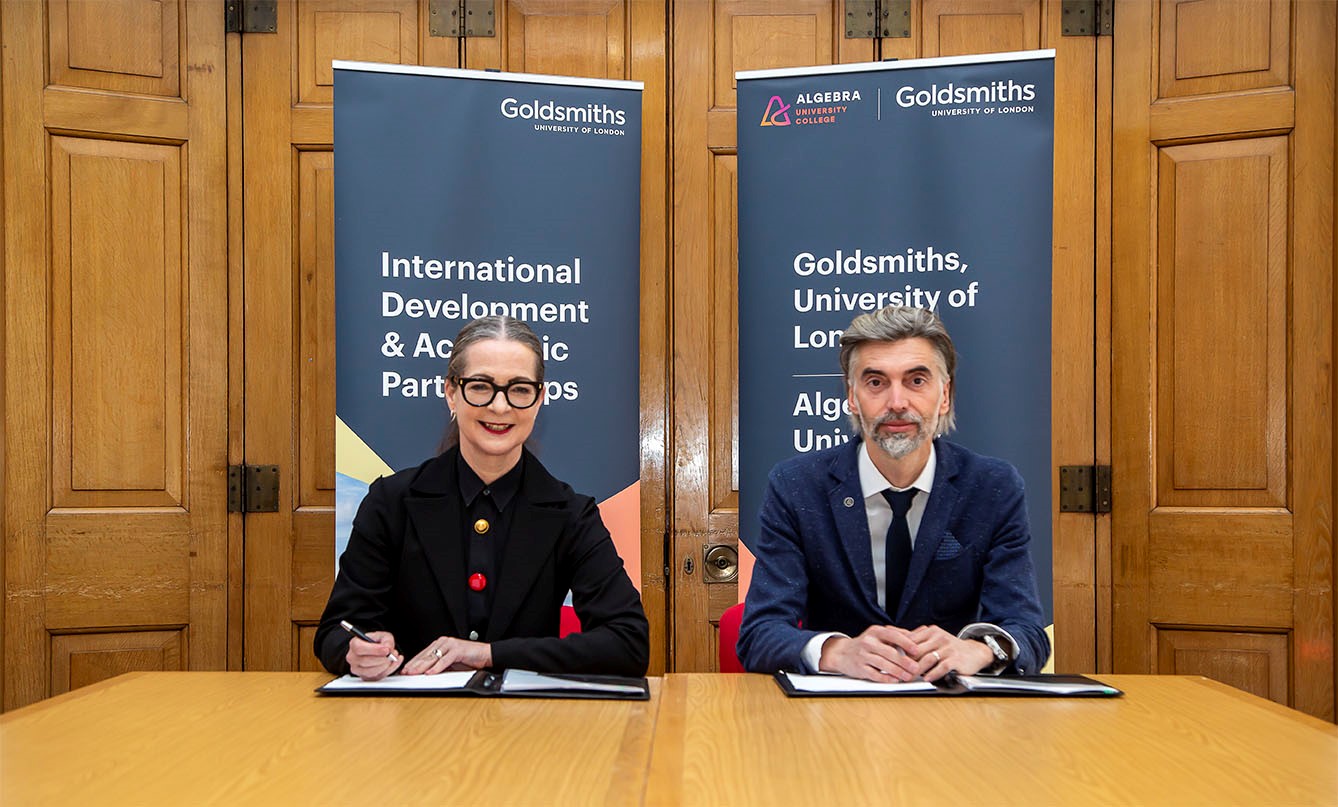
The Algebra and Goldsmiths Academic Partnership Agreement is the result of a two-year validation process of Algebra's study programmes, student support framework and quality assurance systems, conducted by British experts and heads of study programmes with their Croatian colleagues: study and department heads, teachers, assistants, vice deans, teaching support department, international application office, examination coordinators and other professional services of Algebra. After analysing the study programmes, their contents and learning outcomes and the quality assurance system, the validation committee established that all the preconditions for cooperation have been met.
Deputy Warden of Goldsmiths, Professor Elisabeth Hill said: “We will collaborate with colleagues at Algebra in ensuring these academic programmes meet the highest quality and standards, are dynamic and responsive to developments in the industry, and are informed by the latest research and advancements in teaching practice. We are confident that students will enjoy the highest quality learning experiences, undertaking cutting-edge academic programmes that will equip them with the skills to thrive in the fast-paced digital and creative sectors and make a real difference in their communities.”
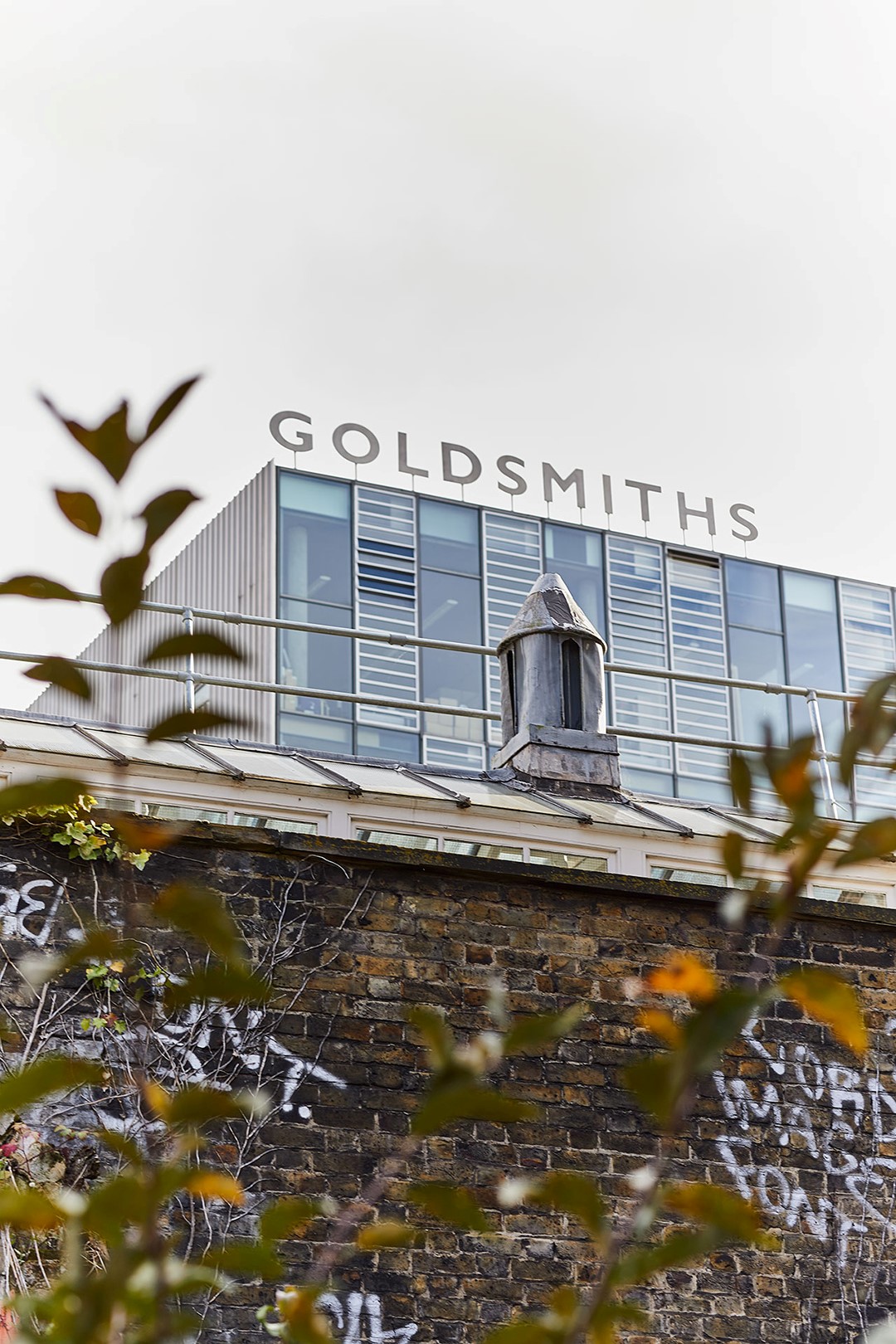
Starting from the academic year 2022/2023, Algebra students will be able to study Design, 3D Design, Multimedia Computing, Digital Marketing, Data Science, Software Engineering, Systems Engineering or Game Development according to programmes validated by one of the 500 best universities in the world. Algebra students who opt for this option will take courses in English. The conditions for enrolment are the same as the conditions for the enrolment of studies conducted in Croatian, with a mandatory test of English language skills.
“In two cycles of audits of the quality assurance system conducted by Croatian Agency for Science and Higher Education, Algebra University College received the highest possible grades and quality certificates. Our highly developed quality assurance system was a kind of ticket to open a dialogue with Goldsmiths and a pledge for this great success that we achieved by signing this Academic Partnership Agreement. During the process of validation of our study programmes, we were additionally convinced of the quality of our partners from London, which prompted us to start double-marking all exams in the current academic year and providing development-oriented feedback to students after each test. These and other approaches that we have adopted, and which are partly the reason why British higher education system is still at the very top of the world, have become our norm in the implementation of study programmes,” said Mislav Balković, Algebra University College Dean, during the signing ceremony of the partnership agreement in London.
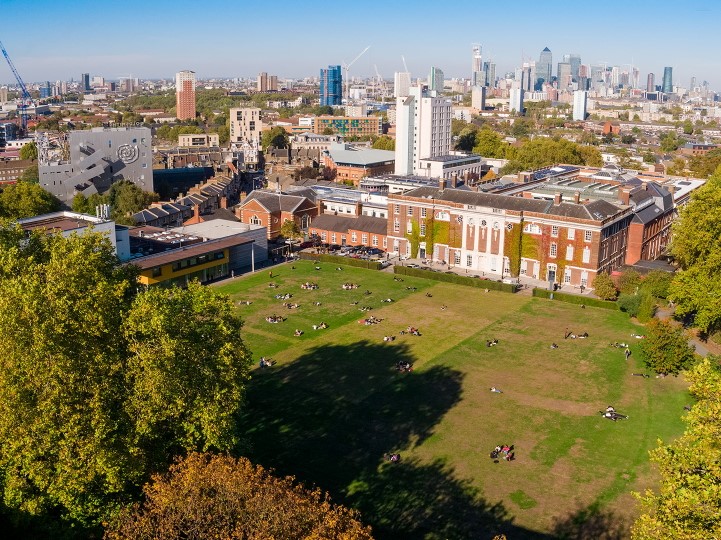
The goal of this collaboration is to increase the number of students studying in English and contribute to the Algebra Development Strategy, which targets 2,300 enrolled students by the end of 2026, of which at least 500 are foreigners. Although the price of such study is somewhat higher than the average price of studies in Croatia, from the perspective of parents and students, this means that with a much lower financial cost and without the cost of living in a relatively expensive environment, students earn two esteemed degrees, trusted by Croatian and British employers.
With this partnership, Algebra forms one of the most potent international hubs for students in Croatia which launched more than 1,000 candidates and students in the past five years. This partnership between the British and Croatian higher educational institutions also opens the door to Algebra graduates who will be interested in postgraduate specialization in the UK. The multinational and multicultural environment that today already exists on Algebra in Zagreb, and is consisted of students from India, Turkey, Brazil, China, USA, Ukraine, Russia, Spain, France, Iran, Kenya, Nigeria, Italy, Macedonia, Kosovo, Bosnia and Herzegovina, Pakistan, Bangladesh, and the UAE, will soon become even more attractive to a growing number of students coming from Asia, South America, Africa, the Middle East and rest of Europe to Croatia.
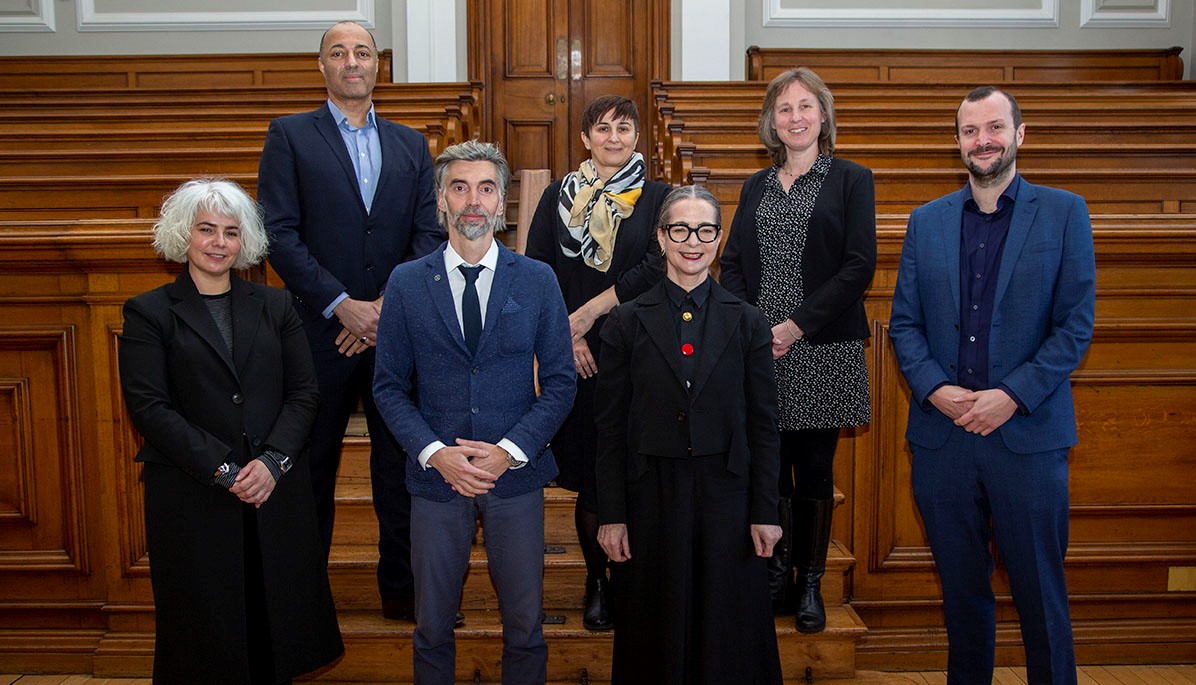
Professor Frances Corner OBE, Warden of Goldsmiths, University of London, said: “We are truly proud of our international partnerships at Goldsmiths, and I am delighted that Algebra University College is joining this global community. This partnership will provide more students around the world with access to a Goldsmiths degree. But more than that, it will bring opportunities to build on the strengths of our two institutions, develop our collaboration between Algebra and Goldsmiths into new and exciting areas, and ensure all students - wherever they study - have a high quality, rewarding and impactful learning experience. I look forward to a rewarding relationship in the years ahead.”
Information and applications for studies ending with a British and Croatian degree are available here. Starting now, high school graduates can choose Algebra undergraduate studies in English through the official portal of the Agency for Science and Higher Education.
For more, check out our dedicated lifestyle section.
PM: Croatia Continues to Foster Friendly Ties with Ukraine, Normal Ties with Russia
ZAGREB, 26 Jan 2022 - Prime Minister Andrej Plenković said on Wednesday that the Croatian government continues fostering friendly relations and partnership with Ukraine and normal relations with Russia.
"Croatia's basic position is respect for the territorial integrity of Ukraine," Plenković said in reference to the Ukraine crisis.
Following all our experience, we give priority to diplomacy and peaceful conflict resolution, de-escalation, and cooperation with our partners within the European Union and NATO, the PM said.
The four-way Normandy format peace talks are taking place today in Paris. The entire international community, from the USA to NATO and the European Union, and all the leaders, want peace. No one wants conflicts, the premier told a news conference.
Last December, Plenković paid a visit to Ukraine and offered Kyiv Croatia's experience of peaceful reintegration of occupied areas, and Croatian Foreign Minister Gordan Grlić Radman visited Russia last week.
Plenković said today that his cabinet's policy is to continue fostering friendly relations and partnerships with Ukraine and to develop normal relations with Russia.
"Croatia's role is constructive, it wants to share its experience that can prevent further conflicts, lessen the tension and share experience, which from our point of view, should lead to solutions."
On Tuesday, President Zoran Milanović said that Ukraine did not belong in NATO, which prompted Kyiv to summon Croatia's Ambassador Anica Džamić.
Milanović said, among other things, that there would be no Croatian soldiers in Ukraine in the event of Russia's invasion and that the events in Ukraine of 2014, known as the Revolution of Dignity, were a military coup, that Europe had not done enough to assist Kyiv, and that the tensions on the Ukraine-Russia border were a consequence of the US home policy.
In a statement on Tuesday evening, the Ukrainian authorities said Milanović's statements in 2014 insulted the feelings of Ukrainians and foreign nationals who gave their lives for a European future.
Plenković today described Milanović's statement as "surreal in every aspect" and recalled that this was not the first time that Croatian ambassadors were being summoned over Milanović's comments.
Plenković recalled Milanović's statements on Bulgaria, Bosnia and Herzegovina, Serbia, and his statements on Hungary and Austria.
This seems to be a consistent track record of upgrading good bilateral relations with a number of countries important for Croatia, the PM said ironically.
Plenković told the press that he had talked with the Ukrainian ambassador in Zagreb and that logically, the ambassador was disappointed by Milanović's statement.
For more, check out our dedicated politics section.
64 New COVID Fatalities, 11,812 New Cases in Croatia
ZAGREB, 26 Jan 2022 - In the past 24 hours, 64 people have died in Croatia as a consequence of coronavirus, and 11,812 new cases have been identified, which means that there are currently 66,027 active cases in the country, the national COVID response team said on Wednesday.
There are currently 1,976 hospitalized COVID patients and 192 of them are on ventilators while 42,446 people are self-isolating.
By Wednesday 26 January, a total of 4,155,056 tests have been conducted, including 22,524 in the past 24 hours.
As of 25 January 2022, a total of 5,061,724 doses of a vaccine had been administered, with 56.44% of the total population or 67.18% of the adult population having been vaccinated.
A total of 2,290,566 people have received at least one dose of a vaccine while 2,199,638 people have been fully vaccinated, which is 64.67% of the adult population.
For all you need to know about coronavirus specific to Croatia, make sure to bookmark our dedicated section and select your preferred language if it isn't English.
Lunar New Year in Croatia: The Basics
January 26, 2022 - As strategic relations between Croatia and China have continued to grow from strength to strength, a look at the Lunar New Year in Croatia.
Over the last decade, relations between China and Europe have warmed as a result of the Belt and Road Initiative, and the “16+1” mechanism between China and Central and Eastern European (CEE) countries.
Similarly, strategic relations between Croatia and China have continued to grow from strength to strength.
A side effect of these collaborative efforts is that more European countries including Croatia, are taking the opportunity to learn more about Chinese culture and incorporate them into their annual festivities.
Within Chinese culture, there is no celebration more important than the Lunar New Year, taking place from February 1-14 this year.
Celebrations in Croatia
In 2016, the City of Zagreb kick-started the first Lunar New Year celebrations in Croatia by lining Josip Jelacic Square with 80 sculptures of terracotta Chinese warriors.
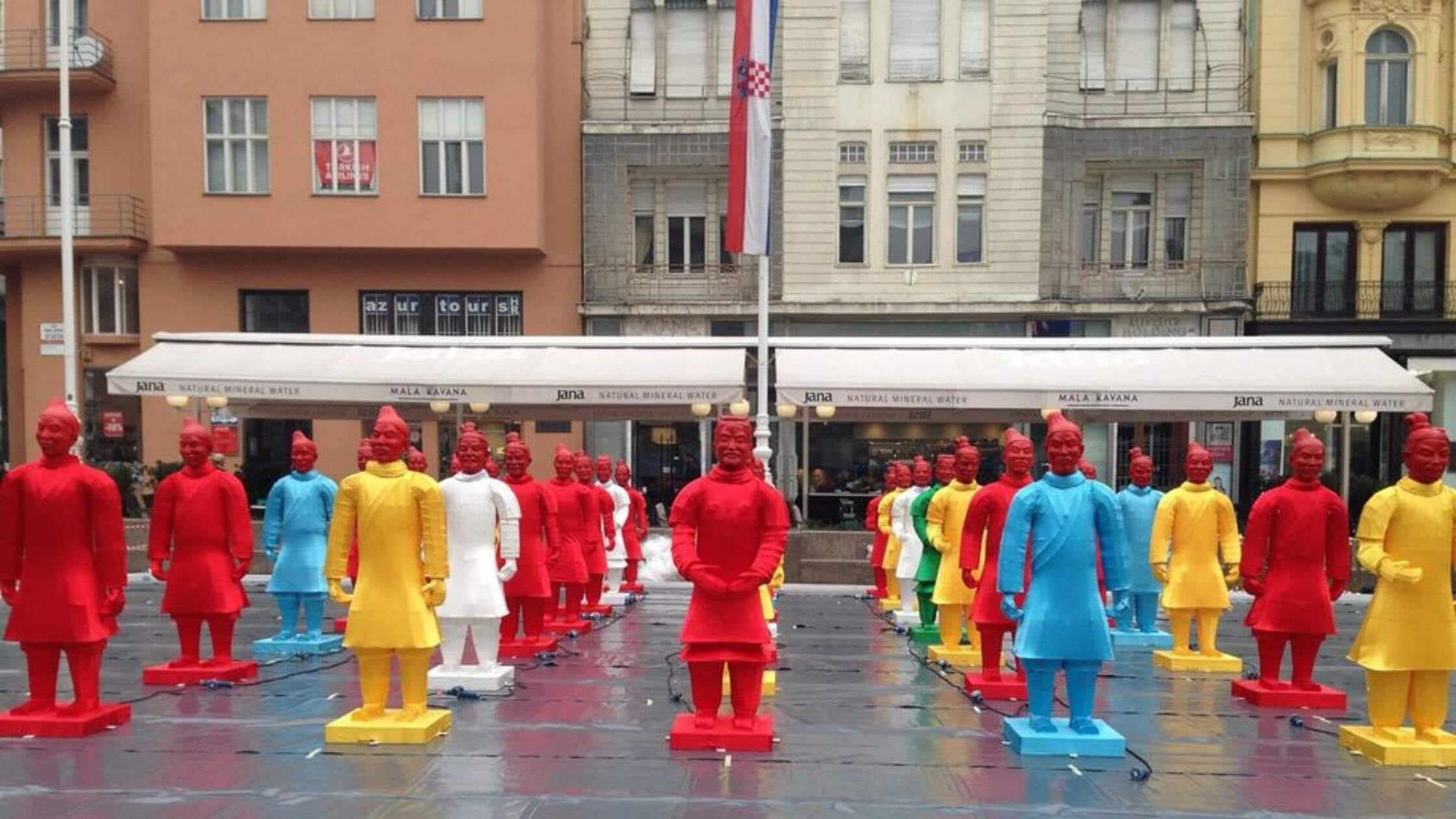
Terracotta Warrior Sculptures 2016, image: Zagreb Tourism Board/Facebook
In 2018 the Zagreb Tourism Board (TZGZ) introduced week-long celebrations before COVID halted further festivities in subsequent years.
But what is Lunar New Year? How is it different from New Year on the 1st of January? And what are some of the traditions involved in the celebration?
Let’s take a brief look at some of the basics.
Lunar New Year 101
The Lunar New Year, also called Chinese New Year (after the world’s largest population of Lunar New Year celebrants), or Spring Festival (春节 Chūn jié). This event is also widely celebrated in places like China, Singapore, Malaysia, Thailand, Cambodia, the Philippines, Taiwan, and Hong Kong.
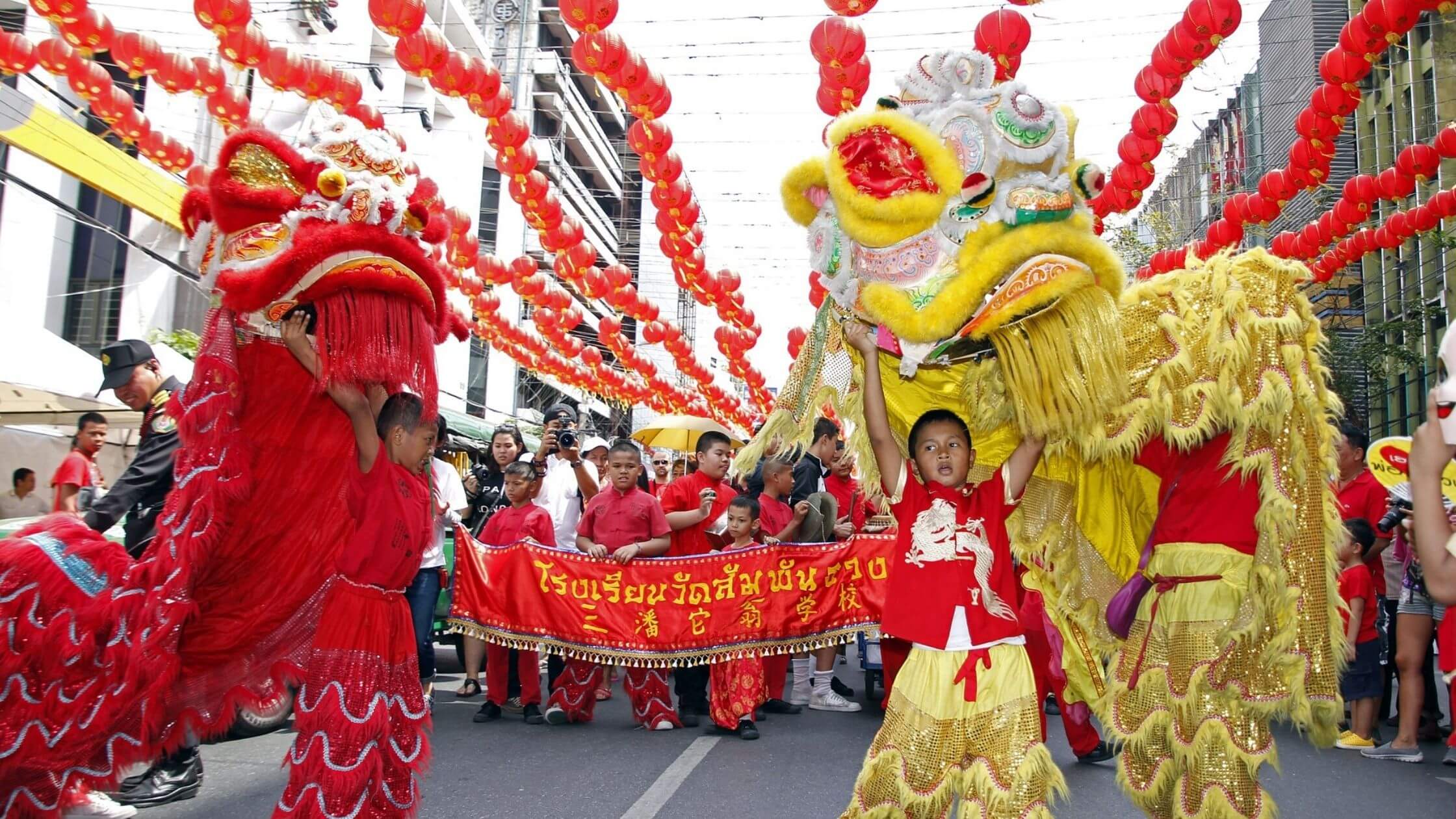
Lunar New Year Celebrations in Thailand, image: Pixabay
In Korea, Lunar New Year celebrations are known as 설날 (Seollal), which lasts 3 days. While in Japan, the Meiji government phased out the use of the lunar calendar in 1873 to be more in line with the West, making celebrations a more muted affair.
Like Thanksgiving and Christmas, Lunar New Year is a time for families and friends to gather, catch up on the past year while consuming copious amounts of food and exchange gifts in the form of money-filled red envelopes (红包, hóng bāo).
Red is an auspicious color for the Lunar New Year, symbolizing happiness, passion, hope, vitality, and luck.
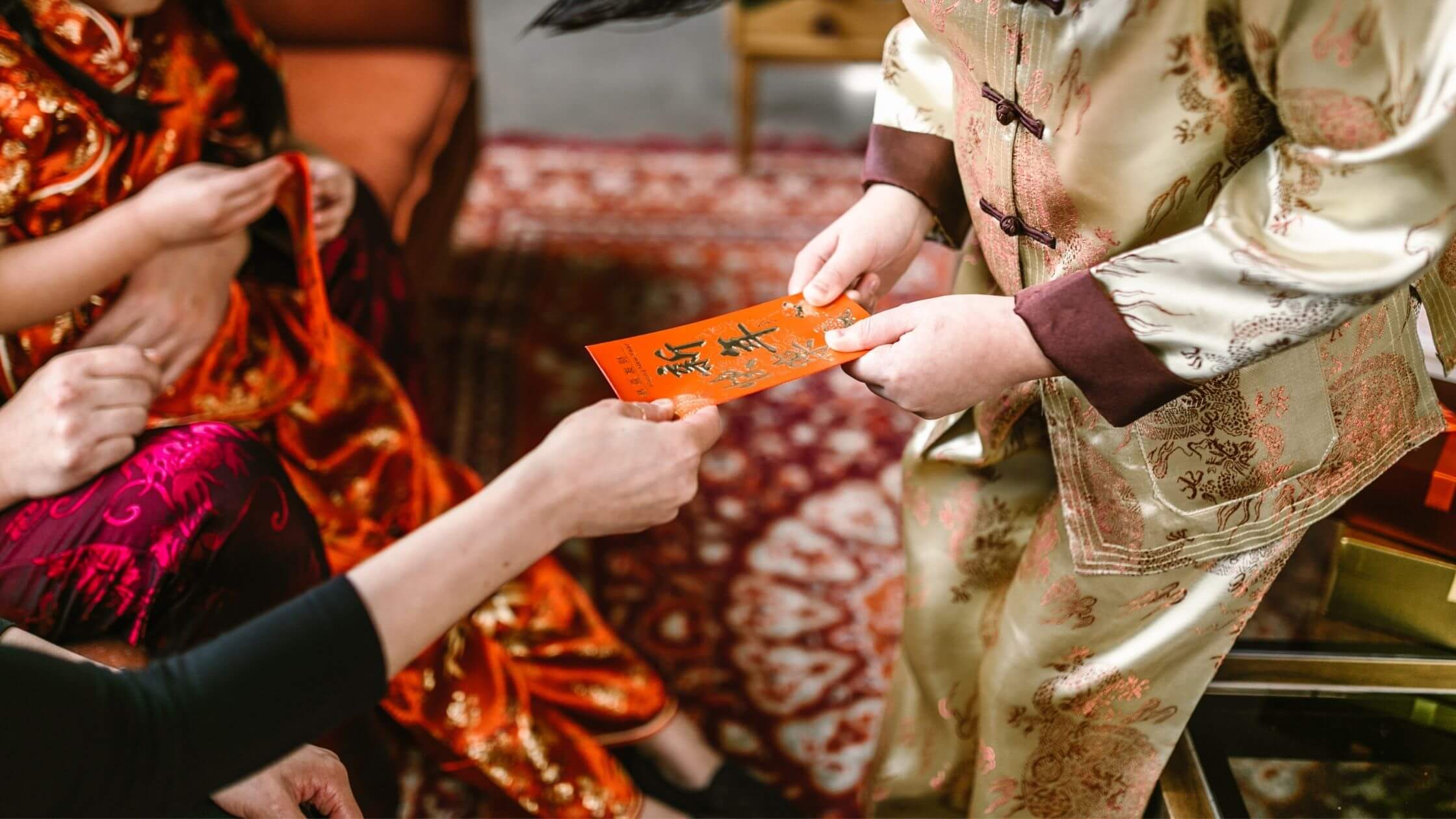
Exchanging of Red Envelopes, image: Rodnae productions/Pexels
Celebrations begin on the first day of the lunisolar calendar, last 14 days, and concludes with the Lantern Festival (元宵节 Yuán xiāo jié). The day before Lunar New Year, families usually come together to partake in a reunion dinner (年夜饭 Nián yè fàn) to begin the festivities.

Reunion Dinner, Image: Angela Roma/Pexels
What is the Lunisolar Calendar?
While the Gregorian calendar, the standard calendar used as the primary means of tracking time worldwide - is the official calendar in all countries that celebrate Lunar New Year, the lunisolar calendar still plays an important role in everyday life.
It determines when traditional holidays such as Lunar New Year, Lantern Festival (元宵节 Yuán xiāo jié), Mid-Autumn Festival (中秋节 Zhōng qiū jié) and Ancestors’ Day (清明节 Qīng míng jié).
Briefly speaking, the lunisolar calendar is a hybrid timekeeping method that accounts for both the earth’s orbit around the sun taking 365 days a year (i.e. Gregorian calendar) and the moon’s orbit around the earth (i.e. Lunar calendar).
On average, the moon’s synodic orbit around the earth takes 29.53 days which is then multiplied by the 12 lunar months. This adds up to approximately 354 days a year, 11 days shorter compared to the solar calendar.
To remedy this discrepancy, an additional 13th month is added to the lunisolar calendar once every 3 years. This once in three-year occurrence is known as (农历 nóng lì), or the agricultural calendar.
Since the lunisolar calendar is not in complete sync with the Gregorian calendar, Lunar New Year can fall anywhere within the months of January or February.
Due to this, the first day of Lunar New Year falls on February 1st this year, marking the beginning of the year of the Tiger.
In 2021, it fell on February 12th, welcoming the year of the Ox, while in 2020, January 25th marked the first day of the year of the Rat.
But why are there different animals for each year and what do these animals represent?
Chinese Zodiac
Each year in the lunisolar calendar is attributed to one of the repeating 12-year cycles of animals known as the Chinese zodiac.
In order, these zodiac animals begin with the Rat, followed by Ox, Tiger, Rabbit, Dragon, Snake, Horse, Goat, Monkey, Rooster, Dog and ending with the Pig.
Each animal is also attributed with a set of traits that broadly categorizes the personalities of individuals born in that year.
For example, those born in the year of the Tiger are said to be independent and competitive yet have impetuous personalities. While those born in the year of the Ox are said to be diligent and honest, but with explosive personalities.
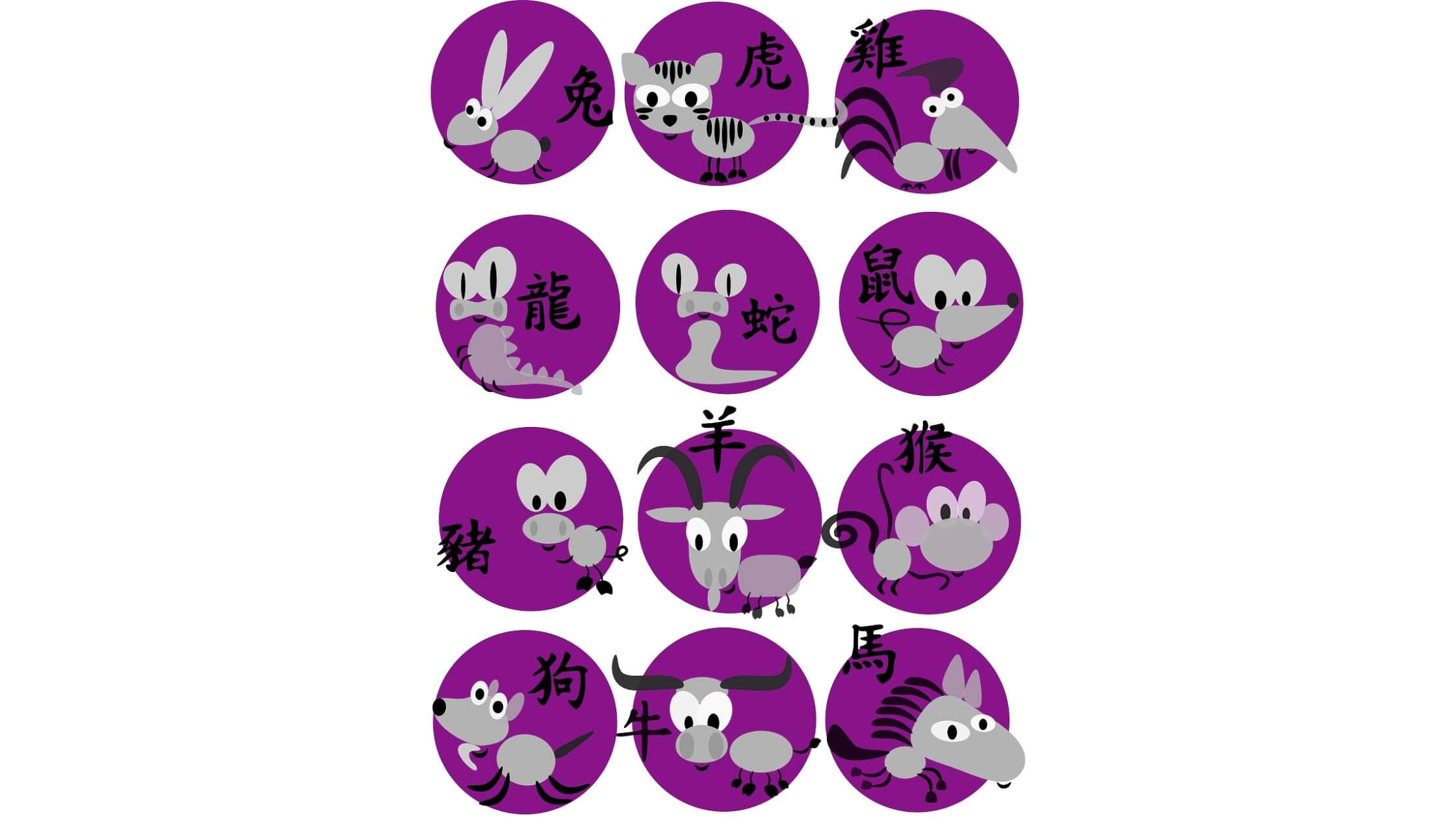
12 Animals of the Chinese Zodiac, image: Pixabay
This zodiac is rooted in a legend dating back to the Qin dynasty in China that ruled over 2,000 years ago. The story goes that the Jade Emperor summoned all the animals within his Kingdom to take part in a great race towards the palace.
The first 12 animals to reach the palace were selected to be part of the zodiac, and the order in which they arrived determined their place.
Lunar New Year thus marks the transition from one animal to the next.
Although this tradition is fading, the Chinese zodiac used to play a vital role in everyday life, determining one’s entire outlook for the year including career, finances, marriage compatibility, health, and more.
So, as we prepare to ring in the second Lunar New Year since the beginning of the pandemic, here’s to a healthy and prosperous Year of the Tiger!
For more, check out our dedicated lifestyle section.


